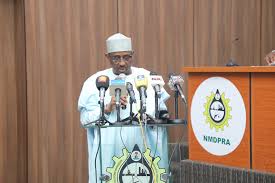NMDPRA Commences Licensing of Lubricant Importers to Curb Substandard Products

The Nigerian Midstream and Downstream Petroleum Regulatory Authority (NMDPRA) has announced its imminent commencement of license issuance for lubricant importation, aiming to eradicate substandard products from the country.
This announcement was made by the Chief Executive of NMDPRA, Mr. Farouk Ahmed, during a stakeholders’ workshop in Abuja on Wednesday.
Represented by Francis Ogaree, Executive Director of HPPITI, Ahmed stated that the initiative seeks to fortify regulation and halt the distribution of low-quality and unauthorized lubricants in Nigeria, as reported by the News Agency of Nigeria (NAN).
The NMDPRA also unveiled the Lubricant Importation Module on the Lube Oil Blending Plant (LOBP) Portal, a tool designed to streamline the application, approval, and monitoring process for lubricant imports.
This module, integrated with the Nigeria Customs Service’s BÓdugwu platform, facilitates seamless clearance, tracking, and improved compliance.
The new licensing regime is in accordance with the Petroleum Industry Act (PIA) 2021, which mandates the authority to uphold quality and safety standards for all petroleum products, including lubricants.
Ahmed described this initiative as a pivotal step towards establishing a transparent, efficient, and quality-driven importation system that will bolster a more resilient and self-sufficient petroleum industry in Nigeria.
Mrs. Ngozi Nwankwo, Director of Liquid at HPPITI, elaborated that the new requirements aim to eradicate substandard imports, enhance transparency, support local blending, and protect both consumers and machinery.
She emphasized that the Lubricant Import Licence is an official endorsement granted by NMDPRA to eligible companies, with only traceable and compliant importers receiving approval under the new system.
However, the Executive Director of the Lubricant Producers Association of Nigeria (LUPAN), Mr. Emeka Obidike, cautioned that this move might adversely affect existing lubricant plants and disrupt recent industry growth, potentially threatening over 200,000 direct jobs and discouraging investment in the lubricant sector.
He further remarked that it undermines the lubricant policy currently being developed by the Federal Ministry of Trade and Investment and contradicts the government’s backward integration agenda.
In response, Ahmed clarified that the initiative is not intended to restrict trade but to reinforce the industry by ensuring only high-quality lubricants enter the market, aligning with President Bola Tinubu’s industrialization agenda to reduce import dependence and enhance local production.







